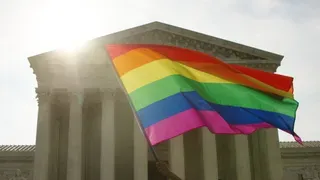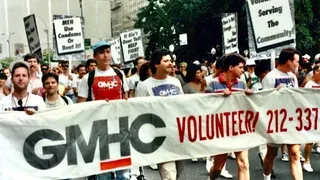April 13, 2011
'Tango' Tops Challenged Books List Once Again
Kilian Melloy READ TIME: 4 MIN.
The tale of two male penguins who nested together, hatched an egg, and raised a chick called Tango has slipped from the #1 spot on the National Library Association's list of challenged books, but it still ranks near the top after all these years.
The children's book, by Justin Richardson and Peter Parnell, recounts the true story of two male penguins, Roy and Silo, who reside in New York City's Central Park Zoo. The penguins had formed a family unit and seemed to be trying to cultivate an egg-sized rock, so a zoo worker gave them an abandoned penguin egg to nurture. Roy and Silo took care of the egg until it hatched--and then cared for Tango, the female chick that emerged.
The book has been consistently targeted for banning by parents seeking to have it removed from school libraries. In 2007, 2008, and 2009, And Tango Makes Three topped the ALA's annual list of "challenged" books.
In 2010, the book lost its top spot, slipping to #2 on the list, behind a series of books by Lauren Myracle that use texting shorthand like "ttyn" in their titles, reported CNN.com on an April 11 article.
This year, And Tango Makes Three clung to the #2 spot, while #1 was filled by Sherman Alexie's memoir The Absolutely True Diary of a Part-Time Indian, CNN reported.
Other books that have made the ALA's top ten "challenged" list over the years include British author Philip Pullman's His Dark Materials trilogy, which American parents see as an attack on Christianity; The Adventures of Huckleberry Finn by Mark Twain; The Kite Runner, by Khaled Hosseini; and I Know Why the Caged Bird Sings, by Maya Angelou.
But among the censorious crowd, And Tango Makes Three has proved to have remarkable staying power.
"Books that address same-sex parenting, or same-sex relationships, are particularly prone to challenges in the U.S.," noted Deborah Caldwell-Stone, deputy director of the ALA, in 2009. "In the case of 'And Tango Makes Three,' there are many parents who believe it inappropriate to teach children anything at all about homosexual relationships, even in the form of a picture book about a true story."
Added Caldwell-Stone, "While not every book is right for each reader, every reader has the right to choose reading materials for themselves and their families and should be able to find those materials in libraries, classrooms, and bookstores.
"Our goal is to protect one of our most precious fundamental rights--our freedom to read."
Another kids' book dealing with a gay character to hit the top ten: "Uncle Bobby's Wedding," by Sarah S. Brannen, in which a child helps celebrate her uncle's marriage to his make life partner. (The characters are all guinea pigs.)
The CNN article recalled that after Tango grew to maturity and headed off on her own, Roy and Silo echoed many a homo sapiens couple--and split up. Silo ended up with a female penguin named Scrappy. Roy ended up alone.
"We wrote the book to help parents teach children about same-sex parent families," Richardson said in a 2005 New York Times article. "It's no more an argument in favor of human gay relationships than it is a call for children to swallow their fish whole or sleep on rocks."
"A challenge is defined as a formal, written complaint filed with a library or school requesting that a book or other material be restricted or removed because of its content or appropriateness," the ALA said in a media release.
Though some books seem to rouse the urge to censor on a long-term basis, society does change over time and books once considered too dangerous or inflammatory come to seem less like threats than like literature in the public's mind. The CNN article noted that several perennial favorites, including Catcher in the Rye, didn't reach a spot in this year's list.
The ALA draws attention to challenged and banned books in the U.S. with an annual Banned Books Week.
"Intellectual freedom--the freedom to access information and express ideas, even if the information and ideas might be considered unorthodox or unpopular--provides the foundation for Banned Books Week," text at the ALA website explains. "BBW stresses the importance of ensuring the availability of unorthodox or unpopular viewpoints for all who wish to read and access them.
"The books featured during Banned Books Week have been targets of attempted bannings," the text adds. "Fortunately, while some books were banned or restricted, in a majority of cases the books were not banned, all thanks to the efforts of librarians, teachers, booksellers, and members of the community to retain the books in the library collections.
"Imagine how many more books might be challenged--and possibly banned or restricted--if librarians, teachers, and booksellers across the country did not use Banned Books Week each year to teach the importance of our First Amendment rights and the power of literature, and to draw attention to the danger that exists when restraints are imposed on the availability of information in a free society," the text continues.
The 2011 edition of Banned Books Week is slated for Sept. 24-Oct. 1.
Kilian Melloy serves as EDGE Media Network's Associate Arts Editor and Staff Contributor. His professional memberships include the National Lesbian & Gay Journalists Association, the Boston Online Film Critics Association, The Gay and Lesbian Entertainment Critics Association, and the Boston Theater Critics Association's Elliot Norton Awards Committee.





